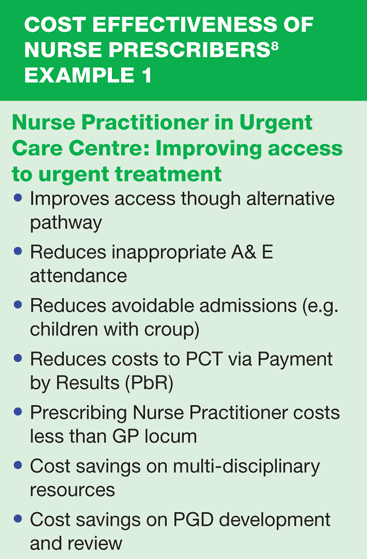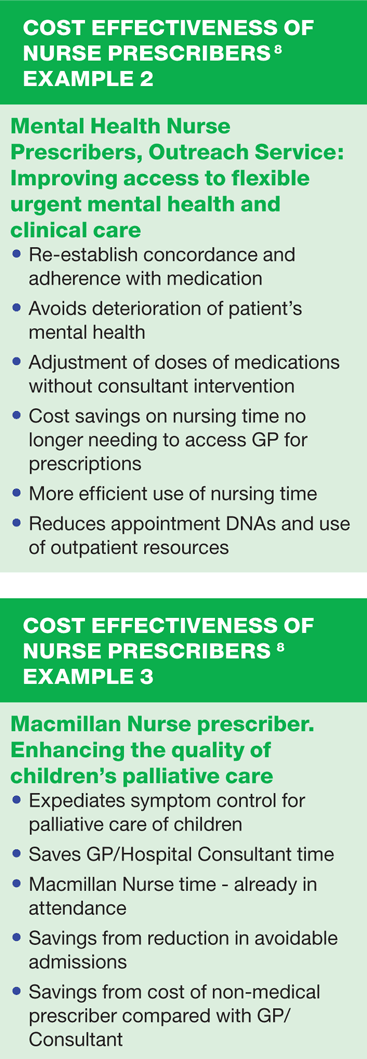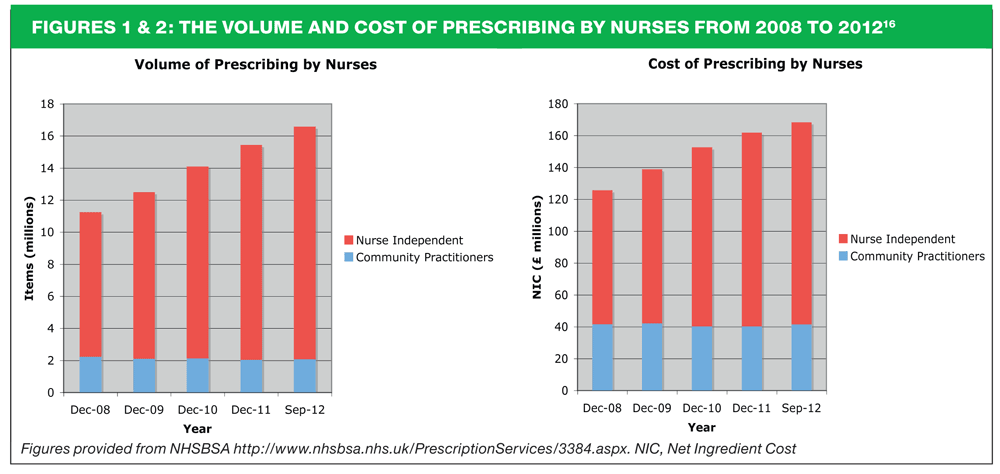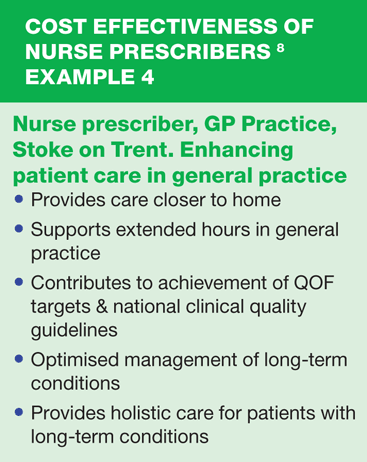Nurse prescribers — are they value for money?
Katherine Hunt
Katherine Hunt
RGN, RM, Bsc (Hons)
Practice Nurse and Nurse Independent and Supplementary Prescriber
Framlingham Medical Practice, Suffolk
Nurse prescribers, an unthinkable idea only a couple of decades ago, are now ubiquitous — but do they really offer value for money, or simply add value to the primary care team?
It is incredible to think that just 21 years ago, the only practitioners who could legally prescribe were doctors, veterinary surgeons and dentists. Since the publication of The Cumberledge Report in 1986, which first identified the need for community nurses to prescribe from a restricted list, the initiation, development and progression of nurse prescribing in the UK has gone from strength to strength. This is underpinned by legislation and championed by NHS reforms, the NMC and the nursing profession as a whole. Today, nurse prescribing has expanded enormously. Independent nurse prescribers can now prescribe any licensed, unlicensed and controlled drug, within their area of clinical expertise and competence, practising within a framework of professional accountability.1—3
CURRENT SITUATION
There are currently 28,104 nurse independent prescribers, and a further 35,051 community practitioner nurse prescribers on the NMC register (NMC 2013, personal communication, 21 March) with the majority of nurse prescribers working in primary care, and this figure is increasing rapidly.4 Such rapid evolution of the nurse independent prescriber must surely indicate a benefit to the NHS as well as improvements to patient care and access to treatment. There is certainly a wealth of information documented in the literature to support this suggestion and it is worth having a look at the evidence.
BENEFITS OF INDEPENDENT NURSE PRESCRIBERS
One of the aims of the Department of Health's NHS Plan in 2000 for investment and reform was to improve patient care through better choice and access to medicines by extending the role of health professionals.5 This was followed by guidance in 2006 from the Department of Health (DH) with the publication of Improving patients' access to medicines: A guide to implementing Nurse and pharmacist Independent prescribing within the NHS in England. So, has there been improved access and better choice for patients, as a result of non-medical prescribing?
PATIENT CHOICE AND ACCESS
Having timely access to safe and appropriate care is clearly at the heart of the NHS. Nurse prescribers in primary care have improved patient access to care and medication by providing independent care to individual patients without disruption to the consultation and the reliance on medical colleagues for supervision.7 For practitioners who prescribe, it has done away with hovering in the corridor for a doctor to sign a prescription, possibly without the doctor even seeing the patient, which is never deemed good practice. The nurse prescriber's knowledge, skills and experience can be channelled to provide efficient, holistic care for patients.
It is quite rare in a consultation that the patient presents with one complaint. It could be that the nurse prescriber becomes aware of other patient worries during a chronic disease review, and is able to deal with these at the same time. During such consultations the nurse prescriber may also manage a medication review, identify other patient concerns or issue additional prescriptions as part of a comprehensive service while undertaking a review of a patient's diabetes or asthma, for example.
Sometimes the outcome of a consultation will be giving advice without issuing a prescription, following discussion and negotiation with the patient, but based on the nurse prescriber's expertise.7
Nurse prescribers can not only provide faster access to care and medication, often through having more readily available appointments than their GP colleagues, but also utilise the skills they possess more effectively.8 However, studies have highlighted that for some prescribing nurses their assessment and diagnostic skills could be better. Evidence also suggests that support from medical colleagues could be improved, as could access to continuing professional development in prescribing.9
Providing patient-centred care is at the root of nurse prescribing and patient acceptability of nurses as prescribers is also fundamental to success. Studies have illustrated how the nurse prescriber's patient-centred consultation, which encompasses the nurse's excellent communication and listening skills, improves patient outcomes.10 And patient satisfaction is high. Patients often feel they have a better rapport with nurses than their medical counterparts. As such, patients find it easier to converse with nurse prescribers, discuss their medication in greater detail and as a consequence have better concordance with that medication.11,12
PATIENT SAFETY
In 2011, the Department of Health published a report following a two-year study led by Southampton and Keele Universities to evaluate the success of independent prescribing by nurses and pharmacists in England.9 The study reported that prescribing by nurses and pharmacists was clinically appropriate and, most importantly, safe as non-medical prescribers (NMPs) not only take full responsibility for their prescribing but are also aware of their limitations and the boundaries of their expertise and knowledge.
A further study carried out in the North West of England also suggests that NMPs demonstrated significant evidence of safe and proficient prescribing within their area of speciality based on their extensive experience and skills.7 In addition, as part of medication reviews, it was evident that NMPs were accomplished at detecting patients who may be taking incorrect medication. They were also alert to potential drug errors. The publication of the 'Single competency framework for all prescribers' by The National Prescribing Centre is a key document for all prescribers to share the same guidance for good prescribing practice, irrespective of their professional background, placing equal value on non-medical prescribers as on doctors.13
BUT ARE NURSE PRESCRIBERS COST EFFECTIVE?
Lack of evidence
It is clear that the growth of non-medical prescribing has led to improvements in accessing medications and patient-centred care, not to mention the increase in job satisfaction, autonomy and professional development for nurses working in Primary Care. But do nurse prescribers really provide value for money? Of course we do, I hear you cry. But where is the evidence?
What evidence there is suggests that 20% of independent prescribers continue to prescribe as supplementary prescribers4 and many continue to rely on Patient Group Directions, rather than prescribing independently, which implies that the NHS may not be getting best value from nurse prescribers.9 In the NHS North West Study, loss of confidence, general isolation, limited support, lack of policy and poor understanding of the NMP's role by managers contributed to some NMPs not using their prescribing qualification.7 Such investment in the training and supervision of NMPs will therefore not be considered best value for money. In Ireland, an evaluation of non-medical prescribing suggested that for some, prescribing was considered somewhat unnecessarily 'overenthusiastic' by nurse prescribers in some instances14 and in another UK study concerns were raised about prescribing not being cost-effective or consistent with national guidance.9 Non-medical prescribers themselves have highlighted that their role inevitably increases the time spent with each patient but this is not always seen in a negative light in that it enables them time to discuss medication in detail with their patients for a better outcome.7
Carey and Stenner,10 in their review of the literature of non-medical prescribing in the UK, suggest that there is little evidence on the cost-effectiveness of the nurse prescriber in the provision of healthcare and that more economical outcome data is needed. This is echoed by Bhanbhro et al15 who suggest that the evidence of health service outcomes and economic data of prescribing by nurses working in Primary Care is lacking. They argue that this information is essential to inform future NHS planning and policy making in primary care.
INVEST TO SAVE
The Business Service Authority (NHSBSA) provides information on the trends in volume and cost of prescribing by nurses and other health professionals. The growth in prescribing can clearly be seen (in figures 1 & 2) in the total number of items prescribed and the cost of prescribing by nurse prescribers over the past 5 years.16 Individual prescribers can access specific information relating to their own prescribing from their PCT/Commissioning Group but how does that demonstrate whether they are prescribing cost effectively?
The National Prescribing Centre's Guide for Commissioners8 suggests that the cost of training, employment, mentoring and clinical supervision of NMPs should be considered against the cost of medical colleagues' employment, health service inefficiencies, misspent time and drug wastage, together with organisational savings, to illustrate that NMPs represent value for money. This Guidance also advocates that NMPs are essential to NHS reform in order to achieve improved access to high quality, personalised care as well as providing patient choice and being cost effective. Commissioners need to invest in and deliver 'best value' services, which make the greatest improvements to healthcare, and it is recognised that nurse prescribers form an essential part of this. The aims of the report Evaluation of nurse and pharmacist independent prescribing 2011 were to evaluate prescribing by these two professional groups to inform future planning, and to recommend how the role of the nurse prescriber could be expanded further.9 An interesting outcome of the North West Study showed that the majority of nurse prescribers continue to work within their same area of practice in the long term demonstrating commitment to their specialist area of work, especially in primary care. It was not only patients that benefited from this role enhancement but also it suggested that the commitment of nurse prescribers remaining in post, extending skills and experience and enhancing the service, was another example of its cost-effectiveness, rather than climbing the professional ladder elsewhere.
The publication 'Non-medical prescribing by nurses, optometrists, pharmacists, physiotherapists, podiatrists and radiographers: A quick guide for commissioners'8 provides examples of where NMP demonstrates not only good practice through audit and evaluation of the services, but also shows how they can be cost effective in order to inform commissioning services of the benefits of NMP and support its implementation. In addition to the value for money of nurse prescribers, the services have demonstrated the benefits to patient choice, improved access to services, reducing health inequalities, personalisation of services, care closer to home and improved quality of care.
However, it does have to be stated that there are few crude data available demonstrating actual economic breakdown of the benefits of the nurse prescriber, although the guidance clearly advocates the huge significance of the nurse prescriber's role in the future of the NHS. The subject of remuneration for nurse prescribers is another issue entirely, although from the 2012 National Salary Survey for Nurses working in UK General Practice, which includes prescribing nurses, the variations of hourly pay and annual bonus (if any!) are considerable.17 No doubt, this in itself opens up another proverbial 'can of worms'.
CONCLUSION
Overall, there is evidence that nurse prescribers do represent value for money in that they address the NHS aims of improving patient access and choice. Although more economic evidence is deemed necessary, the data that are available have informed recommendations to commissioners and other stakeholders, that non-medical prescribing is integral to the future of health service provision. It is without doubt that the benefits to the practitioner of nurse prescribing are enormous in terms of professional development, autonomy and job satisfaction. Further published data are needed to demonstrate the bigger picture of the economic value of the nurse prescriber, but equally it is clear that the nurse prescriber's role is fundamental to the future of the NHS. Indeed, nurses who have yet to take to the plunge can, hopefully, see the benefit to their own professional development, patient care and to the NHS as a whole. Ultimately, however, it is the patient that benefits from the enhanced skills and extended role of the nurse prescriber and the quality of the care provided as a result.
REFERENCES
1. Nursing and Midwifery Council. Standards of proficiency for nurse and midwife prescribers. London. NMC. 2006 Available at: www.nmc-uk.org/Documents/ Standards/nmcStandardsof ProficiencyForNurseAndMidwifePrescribers.pdf
2. Home Office. Nurse and pharmacist independent prescribing, 'mixing of medicines', possession authorities under patient group directions and personal exemption provisions for Schedule 4 Part II drugs. Circular 009/2012. London. April 2012 Available at: http://www.homeoffice.gov.uk/about-us/corporate-publications-strategy/home-office-circulars/circulars-2012/009-2012/
3. Nursing and Midwifery Council. Nurse and midwife independent prescribing of unlicensed medicines. Circular 04/2010. March 2010. Available at:
http://www.nmc-uk.org/Documents/Circulars/2010circulars/NMCcircular04_2010.pdf
4. Royal College of Nursing. Factsheet: Nurse prescribing in the UK. RCN. 2012
Available at: http://www.rcn.org.uk/__data/assets/pdf_file/0004/462370/15.12_NursePrescribing_in_the_UK_RCN_Factsheet.pdf
5. Department of Health. The NHS Plan: A plan for investment. A plan for reform. DH 2000. Available at: http://www.dh.gov.uk/prod_consum_dh/groups/dh_digitalassets/@dh/@en/@ps/documents/digitalasset/dh_118522.pdf
6. Department of Health. Improving patients' access to medicines: A guide to implementing Nurse and pharmacist Independent prescribing within the NHS in England. Gateway reference: 6429. April 2006 Available at: http://www.dh.gov.uk/prod_consum_dh/groups/dh_digitalassets/@dh/@en/documents/digitalasset/dh_4133747.pdf
7. Hacking S, Taylor J. An Evaluation of the scope and practice of non-medical prescribing in the North West for NHS North West. Final Report. 2010. Available at: http://217.33.237.51/document_uploads/Audit/pfs_FinalNMP10.09.10.pdf
8. Non-medical prescribing by nurses, optometrists, pharmacists, physiotherapists, podiatrists and radiographers. A quick guide for commissioners. NHS
National Prescribing Centre. March 2010. Available at: http://www.npc.nhs.uk/non_medical/resources/NMP_QuickGuide.pdf
9. Evaluation of nurse and pharmacist independent prescribing. DH Policy Research Programme project 016 0108. Crown copyright. 2011. Available at: http://www.dh.gov.uk/prod_consum_dh/groups/dh_digitalassets/documents/digitalasset/dh_126436.pdf
10. Carey N, Stenner K. Does non-medical prescribing make a difference to patients? Nursing Times. 2011;107(26):14-16.
11. Courtenay M, Carey N, Stenner K, et al. Patients views of nurse prescribing: effects on care, concordance and medicine taking. British Journal of Dermatology. 2011;164(2):396-410
12. Stenner K, Courtenay M, Carey N. Consultations between nurse prescribers and patients with diabetes in primary care: a qualitative study of patient views. Int J Nurs Stud. 2011;48:1,37-46
13. NHS National Prescribing Centre. A single competency framework for all prescribers. NICE. 2012. Available at: http://www.npc.co.uk/improving_safety/improving_quality/resources/single_comp_framework.pdf
14. Drennan J, Naughton C, Allen D, et al. Independent Evaluation of the Nurse and Midwife Prescribing Initiative. University College Dublin. 2009. Available at: http://www.hse.ie/eng/services/Publications/services/Hospitals/prescribing_initiative.pdf
15. Bhanbhro S, Drennan V, Grant R, et al. Assessing the contribution of prescribing in primary care by nurses and professionals allied to medicine: a systematic review of literature. BMC Health Services Research. 2011;11:330 Available at: http://www.biomedcentral.com/content/pdf/1472-6963-11-330.pdf
16. NHS Business Services Authority. Prescription services: Non-medical prescribing. NHSBSA. 2012. Available at: http://www.nhsbsa.nhs.uk/PrescriptionServices/3384.aspx
17. National Salary Survey for Nurses working in UK General Practice. 17 January 2013. Interavo http://www.practicenursing.co.uk



